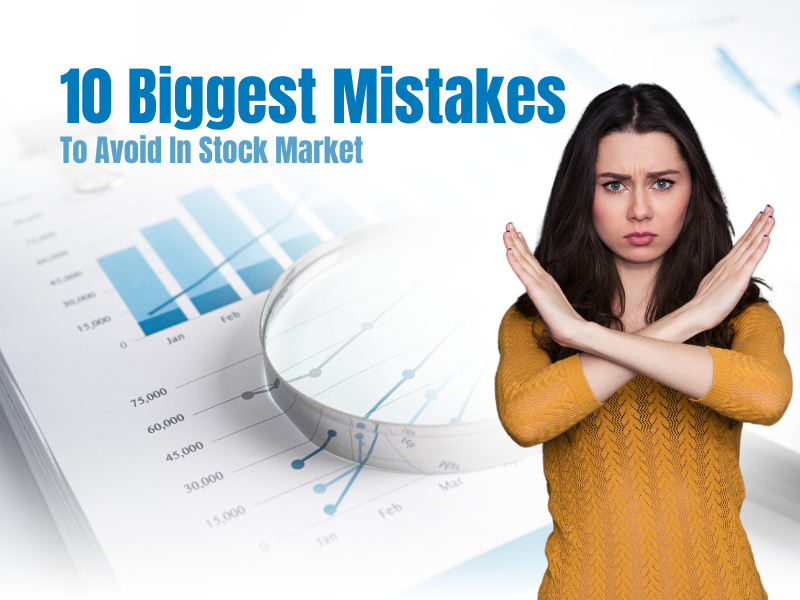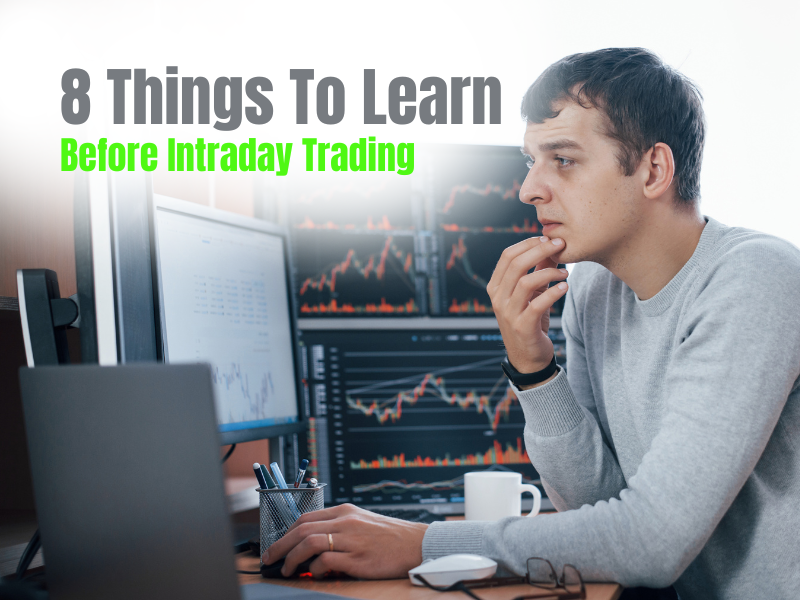The stock market consists of beginners and experienced ones who still commit mistakes. Thus, knowing the 10 Biggest Mistakes To Avoid In Stock Market is a must. Being patient in the hustling stock market is important yet challenging because several traders jump to make decisions before a proper analysis.
In that case, impatient traders were hit by the ups and downs in the stock market in 2020, while the patient ones benefitted when the market bounced back. So, why not learn from others’ mistakes in stock market? Here is a detailed list of the common mistakes in stock market and the strategies to avoid them.
10 Stock Market Mistakes To Avoid before investing
1. No Knowledge of the Business Model
You might not study the company's business model thoroughly before investing in its stock, and it is risky. Moreover, it leads to insufficient planning, which is risky. Even renowned businessmen advise people to avoid such mistakes in stock market.
Solution
Analyse how the company performed in the last half decade and whether it can survive one more decade. Calculate the dividend on equity, earnings per share, and more. Also, compare the stocks of more than one company and check whether the company is in debt, has stable operations, or has less-hyped shares.
2. Prioritising Emotions
You might decide to buy stock after listening to your friends or family members and end up making irrelevant decisions based on emotions. It is, obviously, a mistake in stock market. Similarly, other emotions that can influence your decisions are fear and greed.
Solution
Study the company thoroughly or hire a financial advisor for better decisions for your business, but do not let anyone randomly make financial decisions for your stock market investment. So, focus on the bigger picture.
3. Holding Wrong Stocks
Like various traders, you might continue to hold a failing stock with the hope of increasing its value in the future. However, it might not go up, and you might suffer unnecessary losses. In this case, you might be timing the stock market based on your predictions, and it might turn out to be the wrong investment strategy.
Solution
Set a stop-loss, which means setting a lower limit for your stock and selling it at a predetermined cost if it performs worse than the limit. Moreover, correct asset allocation is the key to maximum returns, rather than timing the market.
4. Following The Rumors In The Stock
There is a difference between genuine news and rumors, especially in the stock market. You might immediately react to the rumors as a newbie, while the expert traders might be waiting for the genuine news. Moreover, it might be risky to always believe the '24-hour' news in the world of the stock market. Solely depending on the news is risky because it has already spread in the market and is affecting market pricing.
Solution
Conduct proper stock market research under proper guidance, and do not quickly fall prey to any sensitive news. You may listen to the news, but make decisions only according to your research and efforts.
5. Believing In The Wrong Advisor
A better financial advisor should be able to solve your financial problems in the stock market and in your regular life. The advisor must consider all your financial aspects and provide appropriate results. However, having the wrong one will increase your problems in the stock market.
Solution
Analyze your financial advisor's performance and results over time. Their formula might differ from yours, but they must provide you with the profits. You may use the law to legally recover bigger losses if your financial advisor provides you with the losses again and again.
6. Taking Wrong Risks
Taking smaller risks results in smaller losses and rewards. On the other hand, larger risks might result in greater results, but they might bring bigger losses that might go out of your hands. Stocks are riskier than bonds because they are affected by the performance of the company. So, concentrating all your investment on a few stocks can pose unnecessary risks.
Solution
Diversification is the solution to taking the wrong risks. According to this concept, you may spread your investment over various assets and stocks instead of letting a few stocks influence your portfolio.
7. Stocks With Low Volume
Stocks with low volume are low-priced, and traders do not tend to buy them. A stock with zero trading volume has no market activity on that day. Moving a stock requires effort, and low-volume stocks will take you to a dead end.
Solution
Look at the volume of the stock rather than just the price. If you have a low-volume stock, use the right strategy to earn rewards. Look at corporate actions and smaller factors that influence the trading volume.
8. Overlooking Inflation
Value stocks perform better during inflation. On the other hand, cash flow decreases in growth stocks. However, their market price and consumer spending both decrease during inflation.
Solution
You may consider several factors, rather than the value in dollars, while purchasing stocks. In that case, your diversified portfolio might help you. Look for stocks that have already beaten inflation before you purchase them.
9. No farsightedness
Trading stocks in the short term creates short-term satisfaction and results in losses for the long term. Moreover, it requires constant analysis and brings limited growth. It is highly volatile and risky, and several traders often lose money here.
Solution
Keep a stop-loss, where you must decide the maximum loss to be suffered by you. Adjust it more if the stock price does not move. Stick to your plan and risk only what you are ready to lose.
10. Overtrading
Overtrading means excessive buying and selling of securities. It leads to increased tax liabilities, many open positions, more transaction costs, and more.
Solution
Add strict entry and exit criteria in trading, maintain discipline and learn when to step away. Control your emotions, as they can lead to overtrading.
Conclusion
No matter how experienced the traders are, they are prone to making mistakes. The key to avoiding unnecessary risks is to have a well-structured plan, which is better if made under expert guidance. Similarly, choosing an appropriate financial advisor is a must. Stock trading requires farsightedness, research, and effort. Stick to your systematic plan and have some extra money at hand to lose anytime because the money market comes with risks.
Mistakes to avoid in Stock market
Mistakes to avoid in Stock market
Mistakes to avoid in Stock market
Mistakes to avoid in Stock market
Mistakes to avoid in Stock market
Mistakes to avoid in Stock market
Mistakes to avoid in Stock market




